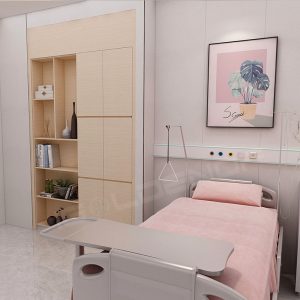1. Contagion
The number one argument for private rooms is infection control.
Around 2 million hospital-acquired infections kill about 100,000 people each year, health officials report. Multiple sick people in a room increase the bad odds. Think about it: a nurse or doctor enters a double-room to check a patient, and before they are able to wash their hands, there’s a moan on the other side of the curtain. The providers rush in to help, and all of the germs they carry come with them. Indeed, single rooms reduce bathroom sharing (enough said), reduce the risk of family members coming into contact with potential infections and make rooms easier to clean and decontaminate.

2. Privacy
Hospital stays generally involve frank discussions about body parts and deeply personal issues, which some people find difficult and stressful. Studies have found some patients actually withhold critical medical information if they think a stranger can hear them. Clough, the Mt. Auburn CEO says: “It becomes noticeably uncomfortable when you talk about a personal issue with just a piece of cloth between you [and your neighbor].” She added that when patients have their own room, they can make middle-of-the-night phone calls or let visitors chatter without worrying about disturbing others.
3. Sleep
It’s not just about the fluffy pillows. Good sleep is critical to healing, and anyone who has spent the night in a hospital knows how elusive it can be. A 2008 white paper by The Center for Health Design and The Georgia Institute of Technology found that “single-bed rooms can reduce noise disturbance from roommates, visitors and healthcare staff and thereby improve patient sleep.” Sleep begets healing which can lead to shorter hospital stays, the thinking goes.
4. Happy Patients, Happy Families
The move toward “patient-centered care” is all about compassion and listening and intuiting everyone’s needs and concerns. Given that hospital stays are by nature unpleasant, what can hospitals do to lighten the mood, and make patients happier? Surveys show most (though not all) patients prefer single rooms due to the reasons already mentioned, (privacy, sleep, less embarrassment, more opportunity for family members to stay, etc.) according to a 2003 review article by researchers at Simon Fraser University. If you don’t have to share a bathroom with three other patients, things tend to look brighter, and you feel more in control.
But to really enhance the experience, says Jeannette Ives Ericson, Senior Vice President for Patient Care and Chief Nurse at Massachusetts General Hospital, you need a “total healing environment.”
Of course, there’s the cost of building all these private rooms, but some argue those costs are mitigated by savings from factors like decreased infections, fewer medical errors, shorter stays, reduced use of drugs and less staff turnover due to better morale.
